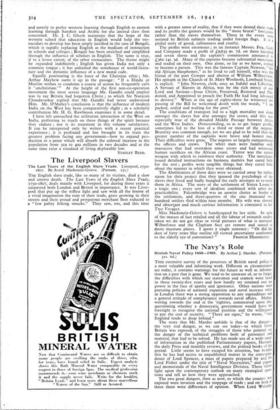The Liverpool Slavers
The Last Years of the English Slave Trade. Liverpool, 1750- 5807. By Averil Mackenzie-Grieve. (Putnam. 555.)
THE English slave trade, like so many of its victims, died a slow and uneasy death. The Last Years of the English Slave Trade, 1750-1807, deals mainly with Liverpool, for_during those years it surpassed both London and Bristol in importance. It was Liver- pool that put up the stiffest fight and saw with all the horror of a vivid imagination the ruin of their trade, grass growing in their streets and their proud and prosperous merchant fleet reduced to a "few paltry fishing smacks." They saw, too, and this time with a greater sense of reality, that if they were denied their trade and its profits the gainers would be the " more brutal " foreigner, rather than the slaves themselves. These in the event were assisted by British subjects trading under foreign flags. It is a pitiful story of greed, callousness and cruelty.
The profits were enormous ; as an instance Messrs. Fox, Croft and Company made a profit of £9,635 9s. 7d. on three hundred and seven slaves and' the captain's commission amounted to L360 14s. 3d. Many of the captains became substantial merchants and traded on their own. One alone, so far as we know, retired to become a parson. This was the famous Captain Newton, "the old African blasphemer," as he lived to call himself, who was the friend of the poet Cowper and abettor of William Wilberforce. His epitaph in the Church of St. Mary Woolnoth, Lombard Street, is explicit. " John Newton, clerk, once an Infidel and Libertine, A' Servant of Slavers in Africa, was by the rich mercy of our Lord and Saviour—Jesus Christ, Preserved, Restored and Par- doned, and Appointed to preach the Faith He had long laboured to destroy." When at the age of eighty-three he witnessed the passing of the Bill he welcomed death with the words, " I am packed, sealed and waiting for the post."
The conditions of transport led to a high mortality not alone amongst the slaves but also amongst the crews, and this was especially true of the dreaded Middle Passage between Africa and the West Indies. Overcrowding, so as to get larger profits, sometimes led to the loss of a third or more of the negroes. Brutality was common enough, yet we are glad to be told that the greater number of the captains were brave and honest men. Their difficulties were great. The negroes so largely outnumbered the officers and crews. The white men were familiar with massacres that had overtaken some crews and had witnessed human sacrifices on the African coast. Terror was the easiest weapon with which to reinforce their authority. The merchants issued detailed instructions on business matters but cared little for the rest ; profits were tangible things but they cared little about the manner in which they were obtained.
The Abolitionists of those days were so carried away by enthu- siasm for their project that they ignored the psychology of the slaves they freed and badly bungled the early attempts to re-settle them in Africa. The story -of the settlement of Sierra Leone is a tragic one ; every sort of idealism combined with utter im- practicability. Falconbridge was an unwise choice as leader of the settlement, and three-quarters of the one thousand two hundred settlers died within nine months. His wife was shrewd and observnt and much curious information is contained in her Two Voyages.
Miss Mackenzie-Grieve is handicapped by her style. In spite of the masses of fact retailed and all the labour of research under- taken we do not get clear or vivid pictures of what is narrated. Wilberforce and the Clapham Sect are remote and unreal as dusty museum pieces. I quote a single sentence : Or did the dust of forty years blur outline till viewed uncertainty conformed to the elderly eye of convention? " FRANCIS HEATHCOTE.


























 Previous page
Previous page